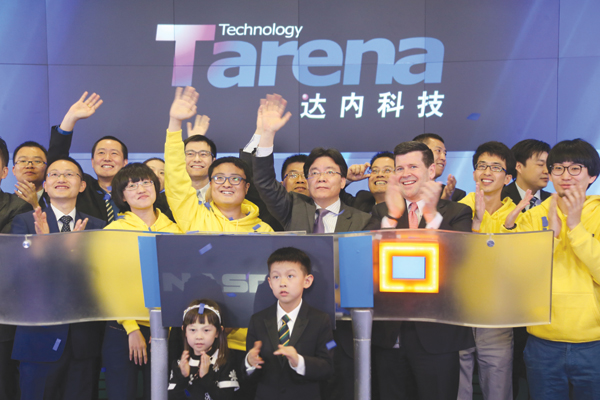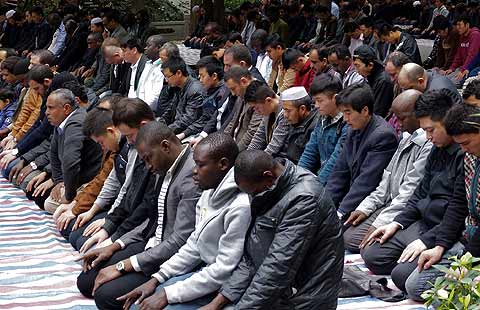Tarena fizzles in its market debut
Updated: 2014-04-07 12:14
By MICHAEL BARRIS in New York (chinadaily.com.cn)
|
||||||||
 |
|
Shaoyun Han, the founder, chairman and CEO of Tarena International, center, and Bob McCooey, the senior vice-president of NasdaqOMX (applauding, next to Han), celebrate Tarena's IPO at the Nasdaq Stock Market. The Beijing education company's shares languished just above their offering price at the market's close last week. [Photo PROVIDED BY NASDAQ] |
The US market for initial public offerings from China continues to show new life. How hot the market will get amid an expected deluge of Chinese technology-related IPOs this spring remains open to question.
In its first two days of trading on the Nasdaq Stock Market, Tarena International, a Beijing-based provider of professional information-technology education services in China, and the first significant Chinese listing so far in 2014, closed just above its offering price.
Tarena sold 15.3 million American depositary shares at $9 each, or $137.7 million. Shares, under the symbol TEDU, rose as much as 20 percent after trading began on April 3 but closed at $9.06 that day and $9.04 the next day.
Some observers saw the IPO as a slightly misguided effort to benefit from investor enthusiasm for Chinese IPOs whipped up by news of planned IPOs from big Internet companies such as Alibaba Group Holding, JD.com and Sina Weibo.
“I do think Tarena's disappointing performance is mostly an aberration, and the company probably accelerated its IPO plan to try and steal some of the hype surrounding the Internet listings,” Doug Young, a financial journalism professor at Fudan University in Shanghai, wrote in his China business blog.
“I would look for the company's shares to post some modest gains in the next few months, but nothing like the gains we've seen for some of the web firms that listed late last year,” Young wrote. “In the meantime, other tech listings should continue to post strong debuts for at least the next 4 to 6 weeks, after which we could start to see enthusiasm start to fade.”
As a “niche provider of education services for software engineers”, Tarena is an anomaly compared with the vast majority of Chinese companies rushing to list in New York, most of which are in the Internet space, Young wrote.
Tarena is considered a leader in an expanding field. Between 2010 and 2013, the company's target market grew to $11.1 billion from $8.1 billion, representing a compound annual growth rate of 11.4 percent. In its prospectus, the company said it holds a leading 8.3 percent share of the China market for professional IT education services, citing data provided by research firm IDC. The average starting salary of 2012-enrolled students was “14.3 percent higher than the national average of college graduates in 2012,” the prospectus said, citing IDC data.
Tarena's disappointing performance is easier to criticize today than it would have been a year ago, when US-listed Chinese stocks were struggling amid a chilly climate for Chinese cross-border listings in the US, according to Young's blog. “A year ago that kind of performance would have been positive, since any gains at that time were a relief,” Young wrote. The market for cross-border US listings from China entered a deep freeze a few years ago after dozens of smaller Chinese companies that sought US stock listings collapsed amid accounting scandals, wiping out some $40 billion of value. The chilly climate curtailed US IPOs from Chinese companies and depressed the share prices of those companies that already were trading in the US.
Tarena's IPO came last week as security software maker Cheetah Mobile Inc, a unit of Chinese software company Kingsoft Corp, filed with US regulators to raise about $300 million in an initial offering on the New York Stock Exchange. Beijing-based Cheetah, formerly known as Kingsoft Internet Software Holdings, did not reveal how many shares it planned to sell or their expected price in a regulatory filing, or the proposed stock symbol.
Kingsoft, which makes entertainment, Internet security and office software, applied to the Hong Kong Stock Exchange in January for permission to spin off its security software business. Kingsoft, which holds about 54 percent of Cheetah, has proposed a dual-class structure that would allow it to retain control and continue to consolidate the unit's financial results after the IPO.
The US market affords Chinese companies options not available in Hong Kong, such as dual-class structures and the ability to list without having turned a profit. It also offers more liquidity than the Chinese mainland's IPO market.
The company, which had 2013 net income of $10.2 million on revenue of $123.9 million, said it would used offering proceeds to strengthen marketing and for other general corporate purposes.
IPOs this quarter also are expected from Leju, a real estate services provider jointly owned by E-House and Tencent, which has filed for to raise $200 million in New York, and Sina Weibo, the operator of the Twitter like social media site, has planned a $500 million IPO on the Nasdaq. Chinese cosmetics seller Jumei.com also filed for a $600 million IPO. Online retailer JD.com said it would hold a $1.5 billion IPO and Alibaba has said it will hold a New York IPO that could rival Facebook's $16 billion offering.
Eric Ryan, managing director, corporate communications at Intercontinental Exchange-NYSE Euronext declined a request for comment on the return to the US of IPOs from China. A Nasdaq spokeswoman didn't respond to an emailed request for comment.
michaelbarris@chinadailyusa.com

 Chilean quake-affected residents demand more help
Chilean quake-affected residents demand more help
 Kidnapping scares Chinese tourists
Kidnapping scares Chinese tourists
 Chinese drama to stage in Silicon Valley
Chinese drama to stage in Silicon Valley
 World's unusual graveyards
World's unusual graveyards
 Chinese directors critique China's cinema
Chinese directors critique China's cinema
 China's first 'sea airship' to be put into commercial use
China's first 'sea airship' to be put into commercial use
 A 'perfect storm' of smog in UK prompts health alert
A 'perfect storm' of smog in UK prompts health alert
 Koala selfie
Koala selfie
Most Viewed
Editor's Picks

|

|

|

|

|

|
Today's Top News
Australia also detects suspicious pulse signal
Kidnappers make 1st phone call to family of Chinese tourist
Kidnapping scares Chinese tourists
Manhattan fights for Chinese tourists
Study zooms in on health of youth
The rush is on for H-1B work visas
Chinese directors critique China's cinema
Pulse signal discovered
in MH370 hunt area
US Weekly

|

|








